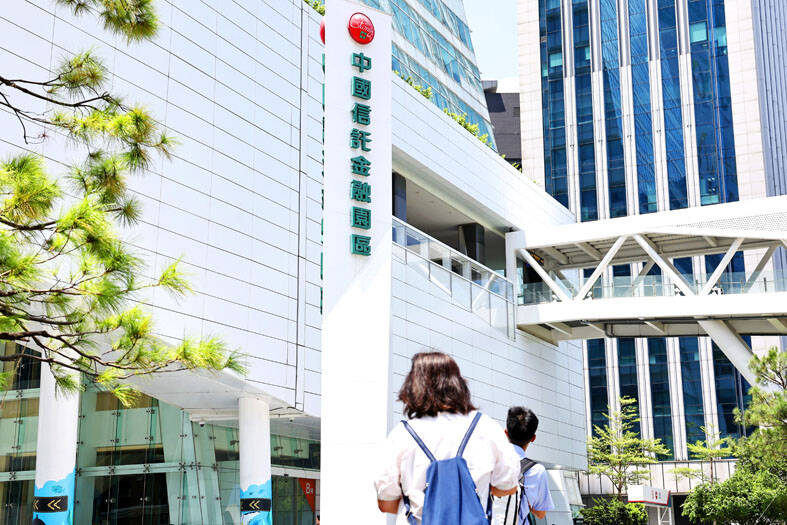The financial sector last month showed early signs of profit recovery as a modest depreciation of the New Taiwan dollar, dividend inflows and capital gains helped offset losses from market volatility and foreign exchange swings in the first half of the year.
Overall results suggest the sector is beginning to stabilize, but only four financial holding companies — E.Sun Financial Holding Co (玉山金控), SinoPac Financial Holding Co (永豐金控), First Financial Holding Co (第一金控) and Hua Nan Financial Holding Co (華南金控) — posted profits exceeding those in the same period last year.
The four groups are primarily banking-focused, allowing them to benefit from steady interest income and loan growth. In contrast, firms with large life insurance operations continue to face greater profit volatility, driven by market fluctuations and foreign exchange risks.

Photo: CNA
Fubon Financial Holding Co (富邦金控) maintained its leading position among peers, topping monthly income, year-to-date profit and earnings per share (EPS), company data showed.
The Taipei-based firm reported a net profit of NT$11.03 billion (US$367.35 million) for last month, taking its cumulative earnings for the year to NT$62.37 billion, or EPS of NT$4.29.
Fubon Life Insurance Co (富邦人壽) contributed NT$5.93 billion, supported by dividend inflows, while Taipei Fubon Bank (北富銀行) generated NT$2.96 billion, buoyed by an 11 percent increase in interest income and a 12 percent rise in fee income compared with the previous year.
Most publicly listed firms in Taiwan issue dividends from June to August, providing additional income boosts during the period.
Cathay Financial Holding Co (國泰金) was second, reporting net profit of NT$9.02 billion for last month and cumulative income of NT$54.77 billion for the first seven months, or EPS of NT$3.50. The group’s banking arm, Cathay United Bank (國泰世華銀行), was the primary growth driver, posting NT$4.21 billion last month and NT$27.59 billion year-to-date, helped by lending activity and improved funding cost management.
CTBC Financial Holding Co (中信金) was third with NT$5.84 billion in income last month and NT$41.68 billion for the year so far, or EPS of NT$2.08. Its core subsidiary, CTBC Bank (中國信託銀行), contributed NT$4.42 billion last month and NT$32.18 billion year-to-date, a 19 percent increase year-on-year.
TS Financial Holding Co (台新新光金控) affirmed its capital adequacy after its recent merger with the unprofitable Shin Kong Financial Holding Co (新光金控). The combined entity posted NT$3.62 billion in net income for last month and NT$13.84 billion for the first seven months, or EPS of NT$0.92.
Among state-run firms, Mega Financial Holding Co (兆豐金控) led with NT$22.44 billion in profit for the first seven months, or EPS of NT$1.51, although that was an 8.7 percent decline compared with the same period last year.

CHIP RACE: Three years of overbroad export controls drove foreign competitors to pursue their own AI chips, and ‘cost US taxpayers billions of dollars,’ Nvidia said China has figured out the US strategy for allowing it to buy Nvidia Corp’s H200s and is rejecting the artificial intelligence (AI) chip in favor of domestically developed semiconductors, White House AI adviser David Sacks said, citing news reports. US President Donald Trump on Monday said that he would allow shipments of Nvidia’s H200 chips to China, part of an administration effort backed by Sacks to challenge Chinese tech champions such as Huawei Technologies Co (華為) by bringing US competition to their home market. On Friday, Sacks signaled that he was uncertain about whether that approach would work. “They’re rejecting our chips,” Sacks

Taiwan’s exports soared 56 percent year-on-year to an all-time high of US$64.05 billion last month, propelled by surging global demand for artificial intelligence (AI), high-performance computing and cloud service infrastructure, the Ministry of Finance said yesterday. Department of Statistics Director-General Beatrice Tsai (蔡美娜) called the figure an unexpected upside surprise, citing a wave of technology orders from overseas customers alongside the usual year-end shopping season for technology products. Growth is likely to remain strong this month, she said, projecting a 40 percent to 45 percent expansion on an annual basis. The outperformance could prompt the Directorate-General of Budget, Accounting and

NATIONAL SECURITY: Intel’s testing of ACM tools despite US government control ‘highlights egregious gaps in US technology protection policies,’ a former official said Chipmaker Intel Corp has tested chipmaking tools this year from a toolmaker with deep roots in China and two overseas units that were targeted by US sanctions, according to two sources with direct knowledge of the matter. Intel, which fended off calls for its CEO’s resignation from US President Donald Trump in August over his alleged ties to China, got the tools from ACM Research Inc, a Fremont, California-based producer of chipmaking equipment. Two of ACM’s units, based in Shanghai and South Korea, were among a number of firms barred last year from receiving US technology over claims they have

BARRIERS: Gudeng’s chairman said it was unlikely that the US could replicate Taiwan’s science parks in Arizona, given its strict immigration policies and cultural differences Gudeng Precision Industrial Co (家登), which supplies wafer pods to the world’s major semiconductor firms, yesterday said it is in no rush to set up production in the US due to high costs. The company supplies its customers through a warehouse in Arizona jointly operated by TSS Holdings Ltd (德鑫控股), a joint holding of Gudeng and 17 Taiwanese firms in the semiconductor supply chain, including specialty plastic compounds producer Nytex Composites Co (耐特) and automated material handling system supplier Symtek Automation Asia Co (迅得). While the company has long been exploring the feasibility of setting up production in the US to address